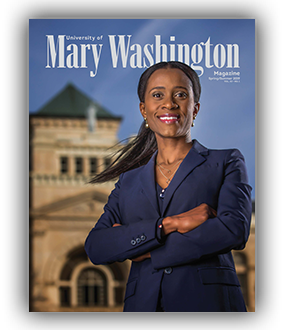
Andrew Ward prepares for a 2017 iKnow Concert, part of a series of festivals in Uganda that attracts music lovers and provides complimentary health services, especially HIV testing. Joel Woodman photo
As a student at Mary Washington, Andrew Ward ’01 scurried up and down Campus Walk, handing out flyers and encouraging his classmates to attend student-organized shows at the run-down but beloved amphitheater. He and his circle of music and theater fans hoped that students who eschewed productions at the more professional on-campus venues, like Klein Theatre and Dodd Auditorium, would embrace shows “run by a bunch of derelicts like us – and they did,” recalled Ward.
The religion and philosophy major, who has earned three advanced degrees since then, said he’s used that same grassroots approach to organizing the iKnow Concert Series. It attracts thousands of music fans each year to what is billed as the largest free music festival in Uganda while simultaneously providing complimentary health services, most notably HIV testing.
“There are definitely elements of the amphitheater onstage in Uganda,” said Ward, who launched the festival in 2014 in Kabale, Uganda, the same year he received UMW’s Outstanding Young Alumnus Award. The amphitheater, now the Heslep Amphitheatre, was renovated in 2018.
After a study by the Global Livingston Institute identified high rates of HIV and economic privation as major concerns for Kabale residents, the Denver-based nonprofit – which partners with communities on international development projects – contacted Ward, a New Orleans resident who had volunteered extensively with citizen-led rebuilding efforts after Hurricane Katrina. Was he interested in joining forces with Ugandans to organize a music, dance, and arts festival that would encourage residents to learn their HIV status while also providing Kabale an economic shot in the arm?
Combining promotional skills honed at Mary Washington with a little New Orleans magic, Ward attached a megaphone to a truck and drove around Kabale, talking up the event, handing out flyers, and throwing beads and condoms to passers-by. He hoped to attract 2,000 people to the first show and that 200 of them would agree to on-the-spot HIV testing.
Instead, 4,000 people showed up and 826 were tested for HIV before organizers ran out of the finger-prick kits, which provide results in 30 seconds. The same folks who had avoided walking into Kabale’s HIV-testing clinics for fear of being seen and stigmatized turned out in droves to the festival, responding enthusiastically to the musicians who announced from the stage, “I just got tested. You should too.”
Four years later, iKnow has produced 18 concerts in six cities in Uganda and Rwanda, featuring a range of artists, from hip-hop and R&B to jazz and traditional. Roughly 224,000 people have attended the free shows, and nearly 30,000 have been tested for HIV, Ward said. All of the clinicians who administer the tests are also trained counselors who speak the local dialect and can immediately connect those who need it to judgment-free services.
At the request of community members, healthcare services offered at the shows have expanded to include tetanus shots, kidney disease screenings, blood donations, and health initiatives like cervical cancer screenings and adult male circumcisions. While the series has focused its efforts in East Africa, officials in Colombia have recently asked iKnow to consider sponsoring a festival there aimed at reducing the stigma associated with breast cancer, Ward said.
The 2019 iKnow series recognized International Women’s Day with a show March 8 in Uganda’s capital city of Kampala – featuring Michael Franti as one of the headliners – before moving to Masaka on March 9 and Kabale on March 12. Reducing the stigma associated with illness and linking at-risk populations with existing but underutilized services is the series’ goal, Ward said.
“It’s about connecting the dots,” Ward said, adding that efforts like iKnow only work with buy-in from the community. “We outsiders launch the ball, but they carry it across the goal line.”
